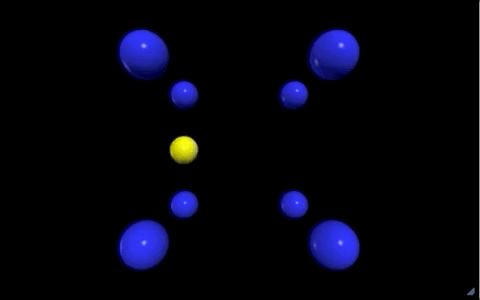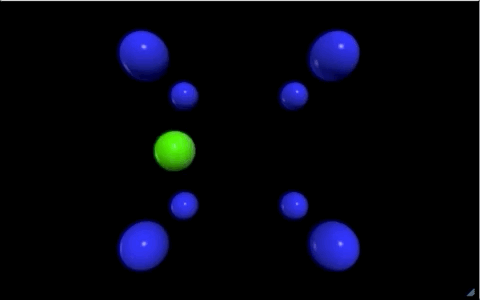Higgs Boson: Difference between revisions
No edit summary |
No edit summary |
||
| (23 intermediate revisions by the same user not shown) | |||
| Line 1: | Line 1: | ||
Claimed by Joshua Hunter Fall 2019 | Claimed by Joshua Hunter Fall 2019 | ||
The Higgs Boson is a fundamental elementary particle that is used to explain mass. | |||
==The Main Idea== | ==The Main Idea== | ||
The Higgs Boson is an elementary particle that is named after Peter Higgs. The concept comes from when Higgs and a group of scientists theorized the Higgs mechanism, an explanation of what we understand as mass. The Higgs Boson occupies the space of the Higgs mechanism | The Higgs Boson is an elementary particle that is named after Peter Higgs. The concept comes from when Higgs and a group of scientists theorized the Higgs mechanism, an explanation of what we understand as mass. The Higgs Boson occupies the space of the Higgs mechanism. The more an elementary particle interacts with Higg Bosons, the more mass they have. The Higgs Boson was theorized in 1964, and confirmed via the scientists at the CERN facility in Geneva on July 4th, 2012. The Higgs Boson has been sensationally known as "The God Particle" by journalists and other media figures, despite physicists disliking that nickname, including Peter Higgs himself. | ||
To understand Higgs Boson, imagine a swimming pool full of water. The swimming pool represents the Higgs mechanism, and the water molecules represent the Higgs Bosons. Fish like dolphins, slip and slide gracefully through the water, with high speed, while whales slowly meander through the water. This is because the dolphin doesn't interact with the water molecules much, whereas the whale interacts with them a lot. Dolphins are like photons in the Higgs Mechanism, the photon doesn't interact with the Higgs Bosons that much so it has very little mass. The whales are like quarks, which interact with the Higgs Bosons a lot, causing them to have a lot of mass. | |||
==A Computational Model== | |||
[[File:PHOTON_EXAMPLE.gif]] | |||
Featured above is a model of a photon, a massless particle, moving through the Higgs mechanism. The blue dots represent the Higgs Boson particles. The photon has no mass because it moves through the Higgs Boson space easily. | |||
[[File:QUARK_EXAMPLE.gif]] | |||
Featured above is a model of a quark, a particle with mass, moving through the Higgs mechanism. It is slowed down because it has mass because it interacts with the Higgs Boson particles in the Higgs mechanism. | |||
==Connectedness== | ==Connectedness== | ||
#How is this topic connected to something that you are interested in? | #How is this topic connected to something that you are interested in? I'm personally interested in micro space and Higgs Boson is one of the bases for microspace. | ||
#How is it connected to your major? | #How is it connected to your major? Chemical Engineering has applications in micro space systems, and the Higgs Boson can be adequately used in this subspace of Chemical Engineering. | ||
#Is there an interesting industrial application? | #Is there an interesting industrial application? Hypothetically, when we move into micro space systems, with solar panels and other constructions, a good knowledge of Higgs Boson could be useful. | ||
== See also == | == See also == | ||
http://www.physicsbook.gatech.edu/Higgs_field | |||
http://www.physicsbook.gatech.edu/Elementary_Particles_and_Particle_Physics_Theory | |||
http://www.physicsbook.gatech.edu/Mass | |||
Latest revision as of 05:18, 25 November 2019
Claimed by Joshua Hunter Fall 2019
The Higgs Boson is a fundamental elementary particle that is used to explain mass.
The Main Idea
The Higgs Boson is an elementary particle that is named after Peter Higgs. The concept comes from when Higgs and a group of scientists theorized the Higgs mechanism, an explanation of what we understand as mass. The Higgs Boson occupies the space of the Higgs mechanism. The more an elementary particle interacts with Higg Bosons, the more mass they have. The Higgs Boson was theorized in 1964, and confirmed via the scientists at the CERN facility in Geneva on July 4th, 2012. The Higgs Boson has been sensationally known as "The God Particle" by journalists and other media figures, despite physicists disliking that nickname, including Peter Higgs himself.
To understand Higgs Boson, imagine a swimming pool full of water. The swimming pool represents the Higgs mechanism, and the water molecules represent the Higgs Bosons. Fish like dolphins, slip and slide gracefully through the water, with high speed, while whales slowly meander through the water. This is because the dolphin doesn't interact with the water molecules much, whereas the whale interacts with them a lot. Dolphins are like photons in the Higgs Mechanism, the photon doesn't interact with the Higgs Bosons that much so it has very little mass. The whales are like quarks, which interact with the Higgs Bosons a lot, causing them to have a lot of mass.
A Computational Model
Featured above is a model of a photon, a massless particle, moving through the Higgs mechanism. The blue dots represent the Higgs Boson particles. The photon has no mass because it moves through the Higgs Boson space easily.
Featured above is a model of a quark, a particle with mass, moving through the Higgs mechanism. It is slowed down because it has mass because it interacts with the Higgs Boson particles in the Higgs mechanism.
Connectedness
- How is this topic connected to something that you are interested in? I'm personally interested in micro space and Higgs Boson is one of the bases for microspace.
- How is it connected to your major? Chemical Engineering has applications in micro space systems, and the Higgs Boson can be adequately used in this subspace of Chemical Engineering.
- Is there an interesting industrial application? Hypothetically, when we move into micro space systems, with solar panels and other constructions, a good knowledge of Higgs Boson could be useful.
See also
http://www.physicsbook.gatech.edu/Higgs_field
http://www.physicsbook.gatech.edu/Elementary_Particles_and_Particle_Physics_Theory

